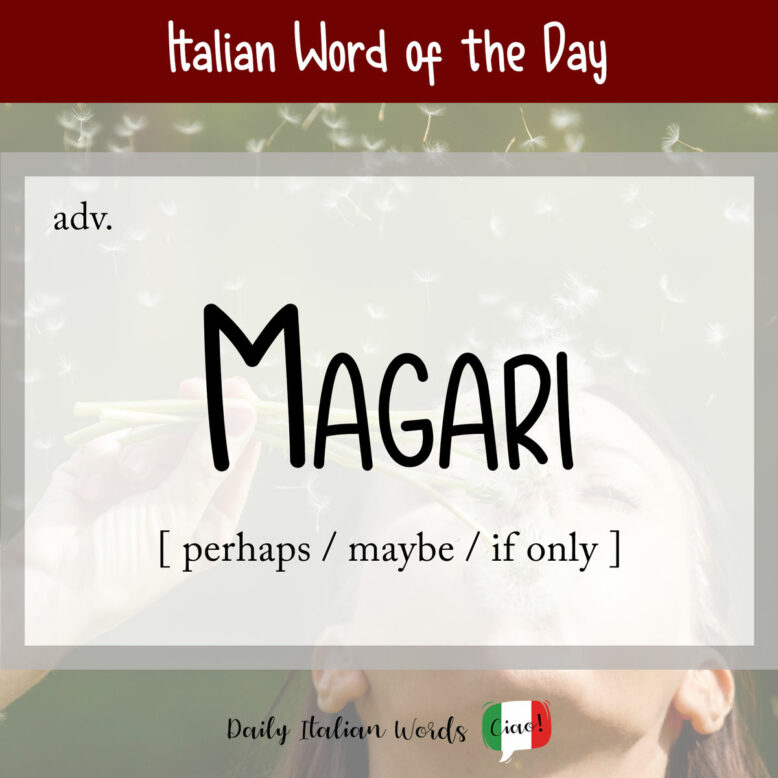Recently one of our readers asked us to write an article explaining the different uses for magari in Italian. Given that this is one of our all-time favourite words, we were more than happy to oblige!

Magari = maybe / perhaps
The translation for magari which learners find easiest to comprehend is maybe or perhaps. Used in this sense, it is more or less interchangeable with the adverbs forse and può darsi (che).
Magari possiamo incontrarci per un caffè domani.
Perhaps we can meet up for a coffee tomorrow.
Magari Maria non sa nemmeno che cosa sia Facebook!
Maybe Maria doesn’t even know what Facebook is!

Magari = If only
Magari is used just as frequently to express a strong desire for something that isn’t easily attainable or even impossible, much like the English expressions If only…! I wish…! or Wouldn’t it be nice if…! In this case, magari is often followed by a sentence with the verb in the imperfect subjunctive.
Magari potessimo andare all’estero quest’anno… È tutta colpa di quel maledetto virus!
If only we could go abroad this year… It’s all the fault of that damned virus!
Similarly, it is used as an affirmative response to a statement made about something unrealistic or impossible.
Quanto sarebbe bello poter andare all’estero quest’anno… – Eh, magari!
Wouldn’t it be nice if we could go abroad this year… – Yeah, if only!

‘Magari’ as a one-word response
Sometimes magari works as a one-word agreement to a proposal or invitation. If your response is enthusiastic, it will sound like the English expressions Of course! or I’d love to! If your interest is moderate, it will sound more like Ok. Yeah. Maybe. or Why not. Your intonation, along with your facial expression, will set the tone.
Vuoi venire con noi al cinema? – Magari!
Vuoi venire al cinema con noi? – Magari.
Do you want to come to the cinema with us? – Of course!
Do you want to come to the cinema with us? – Yeah, maybe.
But bear in mind that, as a one-word response, it can also be used sarcastically to mean the following:
- You think?
- You can say that again!
- It’s about time!
- Well, duh!
Forse dovrei chiamare mia mamma per dirle che non vengo a casa stasera. – Eh, magari!
Perhaps I should call my mom to tell her I won’t be home tonight. – You think?

Magari = Even if / even (colloquial)
If you thought the “magari saga” ended here, think again! That’s because it is also an acceptable substitute for anche se (even if) in colloquial Italian. Once again, the imperfect subjunctive form of the verb is required. For example:
Imparerò l’italiano, magari ci mettessi vent’anni!
I will learn Italian, even if it takes me twenty years!
Last but not least, it can translate as even when used as an adverb.
Grazia, magari, potrebbe decidere di licenziarsi e mettersi in proprio.
Grazia might even decide to resign and branch out on her own.

Heather Broster is a graduate with honours in linguistics from the University of Western Ontario. She is an aspiring polyglot, proficient in English and Italian, as well as Japanese, Welsh, and French to varying degrees of fluency. Originally from Toronto, Heather has resided in various countries, notably Italy for a period of six years. Her primary focus lies in the fields of language acquisition, education, and bilingual instruction.


